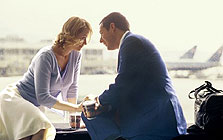|
|
|
|
Punch-Drunk
Love
|
 |
|
The immense delight which this militantly odd film occasions is hard to convey. How to describe the élan which accompanies the berserk movement of a pissed-off woman, Elizabeth (Mary Lynn Rajskub), as she stomps into the office of her anti-social brother, Barry (Adam Sandler)? Or the anarchic humour of glimpsing Barry's luckless assistant, Lance (Luiz Guzman), falling off a defective chair? Or the tenderness that pours from the screen every time writer-director reprises what is obviously his favourite movie song, "He Needs Me" from Robert Altman's much-disparaged Popeye (1980)? Holding a fairly low opinion of both Boogie Nights (1997) and Magnolia (1999), I am far from being an Anderson cultist. But this new film is an extraordinary departure for him. He leaves behind the pompousness and pretentiousness of his social mosaics to invent a surreal world that could only be conjured by cinema. In the process, he sheds what has been so irritating in his style and enhances what is most daring. I have now seen Punch-Drunk Love three times, and every time it is a different film – a prism that successively reveals its dark and light facets. From one angle, it is a modern romantic comedy, with generous allusions to the colour palette and giddy, emotional tone of Hollywood musicals. From another angle, it is a disquieting essay on frustration, neurosis, aggression and violence. Ultimately, it is all these things mixed up together, indivisibly. Even an attempted plot synopsis is bound to read like a surrealist poem, a dizzy free-association of objects, characters and events. One morning, early at work as usual, Barry stumbles upon a way to reap many frequent flyer miles from a supermarket promotion. Unnerved by some intangible premonition, he goes out into the street, witnesses a car accident, and has an old harmonium dropped at his feet. He also happens to encounter the mysteriously intense Lena (Emily Watson), who will become the focus of his deepest yearning. Later surprise plot moves involve phone sex, extortion, a trip to Hawaii, Barry's seven sisters, a gang of four brothers who come to beat him up, and many puddings (one of which can be very faintly heard speaking). Holding this craziness together is the most inspired central casting since Jerry Lewis and Shirley MacLaine faced off on a staircase in Artists and Models (1955). Punch-Drunk Love engineers, through the tangle of Sandler and Watson, the unlikely meeting of Mr Deeds (2002) with Breaking the Waves (1996). And in this movie, which is all about bodies and the inventive things that can be done with them, these actors give compellingly physical performances. There are a thousand wonderful details, on every level, in this inexhaustible film. The texture of its image-sound-performance fusion is bottomless. As a director, Anderson here reveals himself to be a virtuoso. His control of mood, timing, sound and image is extraordinary. Every room or location in the film is like a territory that he stakes out, explores and then somehow turns inside out – often through a burlesque catastrophe. The tension that is built through even the smallest movements – such as people walking down long corridors – is incredible. And the soundtrack, on all its levels from Jon Brion's radical musical score to Gary Rydstrom's ingenious aural design of voices and noise effects – is the most exciting thing I have heard in a cinema in years. I admired only one scene in Boogie Nights – the unnerving and hilarious incident involving a flipped-out drug dealer firing guns in front of his customers as he raves. Anderson has, in a sense, now taken that scene and made a whole film out of it – adding a little love along the way. In this film – at least for an audience which is receptive to the experiment – Anderson creates an experience that grips the viewer so tightly that, ultimately, only mad laughter can save the day. Could there ever be another movie in which the words "I want to smash your face with a sledgehammer" sound so hilarious and liberating? Punch-Drunk Love is a miracle, destined for future cult status. © Adrian Martin
April 2003 UPDATE – on the occasion of the Criterion Blu-ray 2017 release: Punch-Drunk Love sits uneasily, for
some viewers and critics, between Paul Thomas Anderson’s Altman-style mosaic
narratives (Boogie Nights [1997] and Magnolia [1999]) and his grand melodramas of fanaticism and
power (There Will Be Blood [2007] and The Master [2012]).
With its lower-key focus on obsessional neurosis, it has more in common with the smaller films at (for now) the extreme
ends of his career, Hard Eight (1996)
and Inherent Vice (2014).
But Punch-Drunk
Love is also a comedy, with no less a popular star than Adam Sandler, so
its strangeness is doubled. And as for being a romance (Emily Watson superbly
cast alongside Sandler), it gleefully redefines the borders of weird.
This most formally perfect and tightly stylised of
Anderson’s films builds each block-sequence into a crescendo of frustration
that usually leads to an act of wild destruction – even when sex is involved.
The picture and sound quality on Criterion’s 2017 Blu-ray treatment of this modern classic is top-notch. But
not much is added to the array of extras provided on the earlier Columbia DVD
release, such as 12 short “Scopitones”, the 12-minute
remix Blossoms and Blood, a “Mattress
Man” commercial, trailers, and two deleted scenes. Don't expect any audio
commentary from Anderson.
Apart from a discussion between two experts on artist Jeremy
Blake (discreetly omitting the macabre story of his death), by far the best new
bonus is the wonderful, in-depth interview with composer Jon Brion, who provides ample insight into the way Anderson
integrates music, sound, colour and set design at every stage of production.
© Adrian Martin
January 2017 MORE Sandler: The Wedding Singer, Eight Crazy Nights, Little Nicky |
![]()